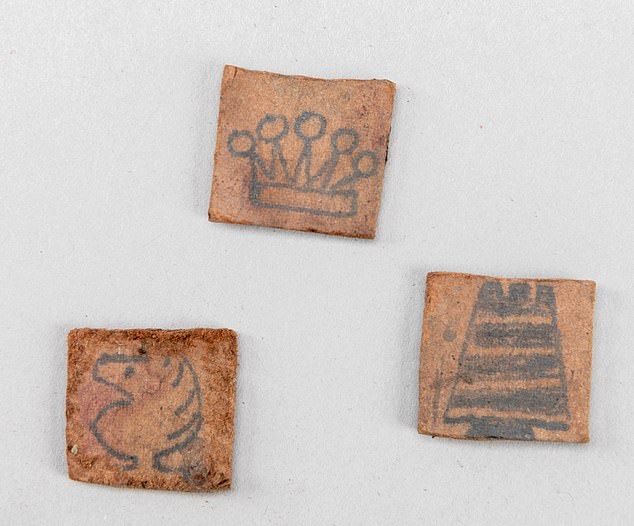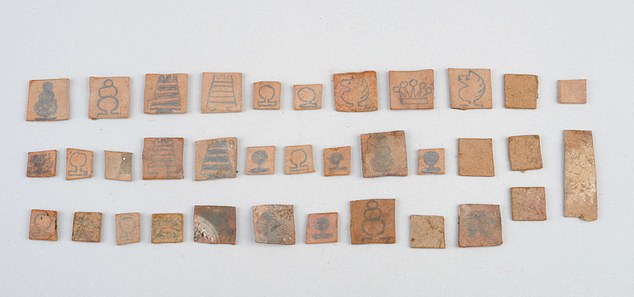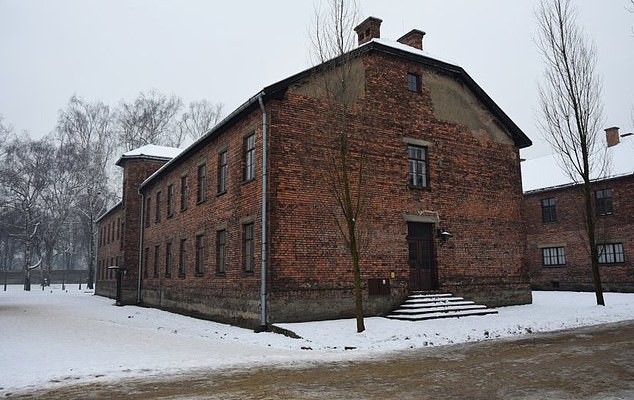The simple game that gave Holocaust victims respite from the horrors of Auschwitz: Dozens of hand-drawn chess pieces are found under death camp’s floorboards where they were hidden from Nazi guards
- They were discovered during renovation work on the first floor of the block
- The chess pieces will be on display in an upcoming exhibition about the lives of prisoners
More than thirty handmade chess pieces have been found hidden under floorboards at the site of Nazi Germany’s infamous Auschwitz death camp.
The 35 cardboard squares with hand-drawn figures were discovered during renovation work on the first floor of former prisoner block 8 in Auschwitz I camp.
Elżbieta Cajzer, head of collections at the Auschwitz Museum, said: ‘Several drawings may be a little blurry, but the images of rooks, pawns, bishops and knights are still easy to distinguish.
‘Yet the set is incomplete and some boxes no longer show traces of the drawing.
‘Our evaluation shows that the objects are in a good state of preservation.
More than thirty handmade chess pieces have been found hidden under floorboards in Auschwitz

‘The chess pieces are made from prefabricated cardboard in a ‘relatively primitive’ way
‘They will now undergo conservation treatment.’
She added: ‘The discovered chess pieces are unique because they were made from prefabricated cardboard in a relatively primitive way.
“We assume that the emphasis was not on aesthetic qualities, but on functionality, easy portability and quick concealment.”
The camp was established in April 1940 to hold Polish prisoners after Nazi Germany’s invasion of Poland. By the time it was liberated in January 1945, the camp had become the largest killing machine in history.
More than 1 million people, mostly Jews, were executed, beaten, tortured, starved, or gassed, while countless others died from disease or malnutrition.
Magdalena Urbaniak of the Auschwitz Museum said that to escape the harsh reality of the camp, prisoners tried to spend their free time playing games.

The newly discovered chess pieces are displayed in an exhibition about the lives of prisoners
She said: ‘Chess and cards were popular games that people could make themselves using illegally obtained pieces of cardboard or wood.
‘Camp prisoners viewed mental activities as a respite from the brutal camp reality.
‘The items needed for the game were usually produced illegally by prisoners.
‘Wood, paper and, less often, other available materials, such as breadcrumbs, served as materials.
“Some of the gaming paraphernalia illegally reached the camp’s inmates from luggage seized from Jewish victims.”
Survivor Jan Dziopek, who worked as a warehouseman in the camp’s carpentry workshop, making chess pieces and boxes, recalled: ‘I received many orders, even from SS men.
“However, I was hesitant to fulfill them. Nevertheless, I had to carry out their orders because, under the guise of working for them, I could fulfill the requests of my colleagues, who paid me with rations of bread or camp soup.

The 35 cardboard squares with hand-drawn figures were discovered during renovation work on the first floor of former prisoner block 8 in Auschwitz I camp
‘My colleagues from kitchens and various warehouses bought these items from me because they could get food without any problems.
‘I will not go into detail about the number of times and how many lashes I received for this.
‘Because I couldn’t tinker in the warehouse for fear of being caught, I created a secret hiding place in the attic and transferred all the necessary tools from the warehouse. I spent hours tinkering with it.’
The newly discovered chess pieces will be displayed in an upcoming exhibition focusing on the daily lives of the camp’s prisoners.
